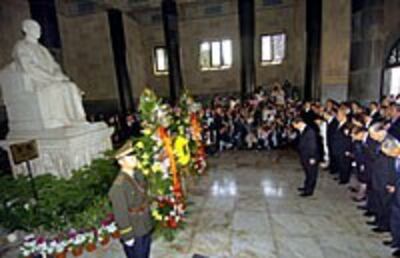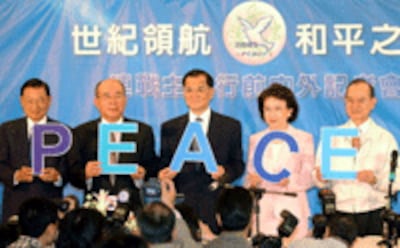
NANJING—Taiwan’s opposition leader, Lien Chan, has begun a groundbreaking visit to mainland China, which he left in 1949. His visit will include talks with president, Hu Jintao—the first meeting between leaders of China's Nationalist and Communist parties in more than a half-century.
But critics say he doesn't have Taiwan's best interests at heart, and that he should use the trip to promote democracy and human rights in China.
A 60-year time difference
Lien arrived in Nanjing, former capital of Kuomintang (KMT), or Nationalist, China, on April 26. His first move was to pay his respects to a key revolutionary figure in modern Chinese history, Sun Yat-sen.
Mainland China and Taiwan have been governed separately since the KMT and its followers fled to the island after losing a civil war to Mao Zedong's communists in 1949.
Building a democracy is the most important thing. If you are not democratic, then the 20-30 million inhabitants of Taiwan are not going to want to re-unify with you.
Though the communist regime in Beijing has never had control of Taiwan, it regards the island as a breakaway province, which it threatens with force should it seek formal statehood.
Beijing ensures that Taiwan remains barred from membership of international bodies such as the United Nations, and the island has few formal diplomatic ties.
"Nanjing is not far from Taipei in space, but it has been more than 60 years since my last visit to Nanjing," Lien told a crowd gathered to greet him. "So, seeing you here this time, I have a feeling of regret for not seeing you any earlier."
Sun Yat-sen a symbol of unity
China has aimed some 700 missiles at the island, making the Taiwan Strait a potential security flashpoint in the region.
Tensions have been reignited by Beijing's enactment of an anti-secession law in March, which sanctioned non-peaceful measures against Taiwan should it push for formal independent nationhood.
In a public honoring of both Communist and Nationalist ideological roots, Lien visited the tomb of KMT founder and revolutionary Sun Yat-sen, who is revered as the leader of the 1911 revolution and the founder of modern China on both sides of the Taiwan Strait.
"Nanjing used to be the base of the KMT government (1911-49)... and and is the resting place of the father of our nation and our founding chairman Sun Yat-sen. I feel very deeply that this is a rare and precious occasion. The aim of the Chinese Nationalist Party is peace and stability in cross-straits relations, and we will go all out to pursue this," Lien told reporters at Sun's tomb.
Democracy 'fundamental' to cross-straits relations
Mainland-born Lien, the first KMT chairman to set foot on Chinese soil since 1949, bowed three times before a statue of Sun, then entered his tomb.
Lien's visit is scheduled to last eight days from April 26-May 3 and will take in four Chinese cities. His meeting with Hu is set for Friday in Beijing.
Beijing has also invited the former KMT politician and chairman of Taiwan's People First Party, James Soong, to visit in Lien's wake.
The aim of the Chinese Nationalist Party is peace and stability in cross-straits relations.
The visits initially drew sharp criticism from Taiwan's ruling Democratic Progressive Party (DPP), which saw them as a Chinese ploy to divide public opinion in Taiwan.
Some mainland Chinese commentators said the visits were more about Taiwan politics than cross-straits relations.
"These two are not really thinking about Taiwan as a whole, but about their own political considerations, their own political capital," youth writer Yu Jie told RFA's Mandarin service.

However, Xian-based dissident Lin Mu said that from Beijing's point of view, the meetings were in keeping with recent emphasis on a "harmonious society". "That means they also have to be harmonious with regard to Taiwan," Lin told RFA's Mandarin service.
"From the point of view of Taiwan people, there can be a warming in relations, a relaxing of the adversarial mood. I don't think they want to have to make a crossroads type of decision."
Gao Yu, deputy editor of the Beijing Economic Weekly, said Lien shouldn't just bring fruit and presents and pay a social call on Hu.
"I think that Lien Chan should bring with him some of what is most advanced about Taiwan's democratic politics to the mainland. If he doesn't do that, then his visit will be meaningless," Gao said.
A 'new channel' for dialogue
"Building a democracy the most important thing. If you are not democratic, then the 20-30 million inhabitants of Taiwan are not going to want to reunify with you."
Taiwan's 23 million inhabitants have enjoyed full and direct parliamentary and presidential elections since the mid-1990s, and many looked on with dismay as Hong Kong's aspirations for full democracy were quashed by Beijing last year.
Shenzhen-based dissident Zao Dagong also said that cross-Straits ties fundamentally hinged on democracy.
Lien's visit opens a new channel for cross-Straits dialogue, namely direct dialogue between top leaders of political parties on both sides.
"I hope that when Lien Chan comes to the mainland he won't forget to bring up the issue of human rights.... The most important issue when it comes to cross-Straits relations is democracy," Zao said.
"If you have done your utmost to suppress Hong Kong's calls for greater democracy, then how sincere is your 'One Country, Two Systems' policy?"
He said he thought a war was unlikely, however.
"The two sides' economies are closely linked together. I don't think the government is likely to use military action as a way of resolving the issue...And I think top Communist Party officials should visit Taiwan, too."
Lien, whose KMT party supports unification with a democratic China, avoided angry crowds in Taipei, who brandished sticks and fired off slingshots and firecrackers.
He was greeted by well-wishers on arrival in China, but also by a small group of protesters who denounced the Chinese Communist Party as "lawless" and called for the return of the KMT. They were quickly removed by security officers.
Taiwan President Chen Shui-bian wished Lien well but warned against entering agreements with Beijing.
Chen initially condemned the KMT for trying to usurp the government's China policy but backpedalled after Lien said he was travelling in a private capacity and wouldn't negotiate, or sign, any agreements with Hu.
China's official media covered Lien's arrival in detail.
"Lien's visit opens a new channel for cross-Straits dialogue, namely direct dialogue between top leaders of political parties on both sides," the official People's Daily online quoted Huang Jiashu, professor at the People's University in Beijing, as saying.
"The visit will facilitate mutual understanding between the two parties and the people on both sides of the Straits."
"The DPP should ponder seriously which path Taiwan should pursue. I hope it will choose a new road other than 'Taiwan independence,'" Huang was quoted as saying.
Original reporting in Mandarin by Hu Hanqiang, Gao Shan, Rong Yi, Fang Yuan and Xiao Rong. RFA Mandarin service director: Jennifer Chou. Produced for the Web in English by Sarah Jackson-Han and Luisetta Mudie.
